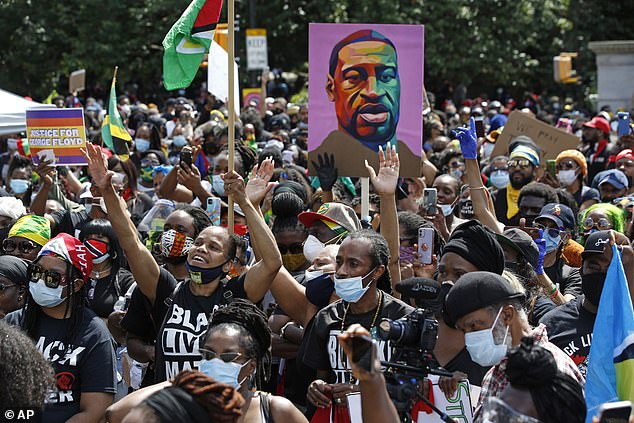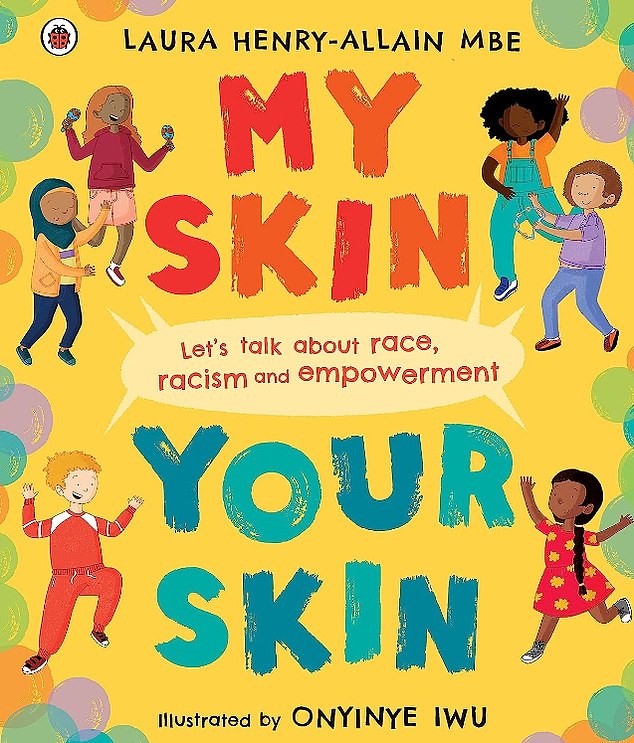
Teachers in thousands of British schools are being told to teach pupils as young as five about racism, with guidance arguing that children are ‘never too young’ to talk about it.
The Key, a national information service which boasts a £30 million turnover, had provided anti-racism resources for more than 13,000 schools and educational trusts in the UK.
Primary schools pupils are taught about American police brutality and that white children are ‘strongly biased’ in favour of ‘whiteness’.
Teachers are told that while topics like police brutality in the US may not seem age appropriate, they ‘are likely to have heard about these issues in the news or discussed them at home.’
Guidance from the information service points towards the death of George Floyd, a 46-year-old unarmed black man who was murdered by police in Minneapolis in 2020.

Primary schools pupils are taught about American police brutality such as the death of George Floyd, a 46-year-old unarmed black man who was murdered by police in Minneapolis
Critics have slammed the initiative after claiming that the material is backed by controversial critical race theory, which accepts that racism is entrenched in society.
Authors and academics claim that the rise of the Black Lives Matter movement has led to British schools importing anti-racism material.
Tomiwa Owolade, author of This is not America, told The Times that theories that originate in the US do not ‘reflect the actual experiences of British children and ethnic minority people in the UK’.
He added: ‘Critical race theory came out of American constitutional law. It’s the argument that after the end of segregation, America had still failed to improve the lives and conditions of black people.
‘That very particular context simply doesn’t apply to the UK, because we’ve never had segregation institutionalised in the UK.’
Campaigners and academics also claim that the research behind the instructions given to teachers for race-related discussions references racial division in the US.
In the guidance, one document titled, ‘How to talk to pupils about racism’, teachers are told that their pupils are ‘never too young’ to talk about it.
An infographic in the guidance, which uses data collected in the US, shows that white five-year-olds are ‘strongly biased in favour of whiteness’.




Authors and academics claim that the rise of the Black Lives Matter movement has led to British schools importing anti-racism material
The same infographic compares this with the attitudes of their black and ‘Latinx’ (Latino) classmates, who show no preference towards their own racial groups.
The guidance also urges teachers to not ‘shy away from more difficult topics’ when discussing differences between people in their classrooms.
Teachers are also encouraged to insist that disadvantaged white children have ‘white privilege’, even when they ‘may not accept it’.
Guidance says that if this is challenged by a pupil who may say ‘but I’m gay, poor, female’, teachers should say that this ‘doesn’t erase their white identity’.
Staff are further instructed to ‘decolonise’ lessons plans and avoid teaching ‘white savior narratives’, such as centering white abolitionists when teaching children about slavery.
This also includes widening music curriculums to ensure that at least 50 per cent of the musicians or composers are from an ethnic minority background.






The guidance also urges teachers to not ‘shy away from more difficult topics’ when discussing differences between people in their classroom
Alka Sehgal Cuthbert, director of Don’t Divide Us (DDU) and the report’s lead author, told The Times that discussions on race with children were important, but criticised the use of critical race theory, which is ‘incompatible with educational aims and a democratic society’.
She said that lessons on race should be had ‘in an impartial way and through the disciplines’, adding: ‘The problem is that this is being done in ways which circumvent that impartiality and in classes with children of a very young age.’
Defended its guidance for teachers, managing director of The Key Michael McGarvey said: ‘Our job is to support schools with any challenges they face, including engaging with complex topics such as promoting equality and addressing racist or prejudiced attitudes.’
The Key was founded in 2007 as a government pilot to provide ‘up-to-the-minute sector intelligence’ for education leaders, with more than 120,000 school leaders are said to use the services.
The company provides packages of digital resources, which can cost up to £2,451 per school, boasts that it provides ‘reliable, relevant and authoritative knowledge that’s ready to use’.
Source: | This article originally belongs to Dailymail.co.uk